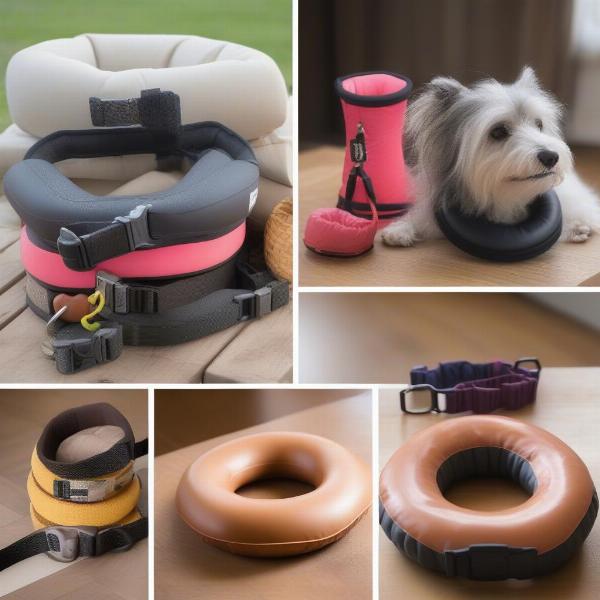A donut dog collar, also known as a soft dog collar or inflatable dog collar, provides a comfortable alternative to the traditional cone of shame. These collars prevent your dog from licking or biting wounds, stitches, or hot spots while healing, but with a much gentler approach. Whether your furry friend has undergone surgery, is battling skin irritations, or simply needs to be discouraged from excessive grooming, a donut dog collar may be the perfect solution.
Choosing the Right Donut Dog Collar
Selecting the right donut dog collar is crucial for ensuring your dog’s comfort and safety. Consider these factors before making a purchase:
- Size: Accurate sizing is essential. Measure your dog’s neck circumference and refer to the manufacturer’s size chart. A collar that is too tight can restrict breathing, while one that’s too loose can be ineffective.
- Material: Donut collars come in various materials like plush fabric, PVC, and microfiber. Choose a material that is durable, easy to clean, and comfortable for your dog.
- Inflation Level: Inflatable collars allow you to adjust the firmness for optimal comfort and restriction. Ensure it’s firm enough to prevent your dog from reaching the affected area, yet not so inflated that it causes discomfort.
- Durability: Opt for a collar made of durable material that can withstand scratching and biting, especially for dogs prone to chewing.
Benefits of a Donut Dog Collar
Donut collars offer numerous advantages over traditional cones:
- Comfort: The soft, plush design provides a much more comfortable experience, allowing your dog to sleep, eat, and move around with ease.
- Reduced Stress and Anxiety: The less restrictive nature of the donut collar can significantly reduce the stress and anxiety often associated with wearing a cone.
- Improved Visibility and Mobility: Unlike cones, donut collars do not obstruct a dog’s peripheral vision, allowing them to navigate their surroundings more easily.
- Easier Eating and Drinking: The donut shape generally doesn’t interfere with eating and drinking, unlike cones that can often block access to food and water bowls.
- donut collars for dogs Come in a variety of fun colors and designs.
How to Introduce Your Dog to a Donut Dog Collar
Introducing the collar gradually can ease the transition:
- Let your dog sniff and explore the deflated collar. Reward them with treats and praise.
- Inflate the collar slightly and place it around your dog’s neck for short periods. Gradually increase the duration as they become more comfortable.
- Supervise your dog while wearing the collar initially. Ensure it fits properly and doesn’t impede their movement or breathing.
- Positive reinforcement is key. Reward your dog with treats and praise when they wear the collar calmly.
Donut Dog Collars vs. Cones
While both serve the same purpose, there are key differences:
| Feature | Donut Collar | Cone |
|---|---|---|
| Comfort | High | Low |
| Mobility | High | Low |
| Visibility | High | Low |
| Stress Level | Low | High |
| Eating/Drinking | Easier | More Difficult |
“For dogs recovering from surgery or injury, a donut collar offers a much more humane and comfortable alternative to the traditional cone,” says Dr. Emily Carter, DVM. “They allow for better mobility, reduce anxiety, and significantly improve the overall recovery experience.”
Are Donut Collars Right for Every Dog? dog donut collar
While donut collars are a great option for many dogs, they may not be suitable for all. Dogs who are particularly determined chewers may be able to reach their wounds, even with the collar on. For these dogs, a traditional cone or dog vet collar might be necessary. Consult with your veterinarian to determine the best option for your dog’s specific needs.  Different types of dog collars for recovery
Different types of dog collars for recovery
Conclusion
A donut dog collar can be a fantastic solution for preventing dogs from interfering with wounds or injuries while offering superior comfort and mobility compared to traditional cones. By choosing the right size, material, and introducing the collar properly, you can ensure a positive experience for your furry friend during their recovery period. Remember to consult with your veterinarian to determine the best option for your dog’s specific needs.
FAQ
- How do I clean a donut dog collar? Most donut collars can be hand-washed with mild soap and water. Check the manufacturer’s instructions for specific cleaning guidelines.
- Can my dog sleep with a donut collar on? Yes, the comfort of a donut collar allows most dogs to sleep comfortably while wearing it.
- My dog keeps trying to remove the collar. What should I do? Ensure the collar is properly fitted and not too tight. Distract your dog with toys or treats and praise them when they leave the collar alone. If the problem persists, consult your veterinarian.
- Are donut collars suitable for puppies? Yes, donut collars are available in sizes suitable for puppies.
- Can my dog wear a donut collar long-term? Consult with your veterinarian before using a donut collar for extended periods.
Related Articles on ILM Dog
About ILM Dog
ILM Dog (https://ilmdog.com) is your one-stop resource for expert advice on dog breeds, health, training, nutrition, grooming, and much more. We provide practical, reliable information to help dog owners worldwide provide the best possible care for their beloved companions. Whether you’re a seasoned dog owner or just starting your journey, ILM Dog offers valuable insights to enhance your dog’s well-being. Contact us for any inquiries: Email: [email protected], Phone: +44 20-3965-8624.